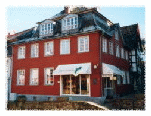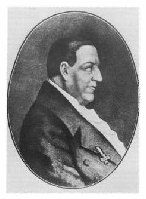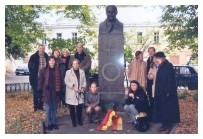Born in the City of Bad Münstereifel
There is a memorial plaque at the corner of Johannisstrasse and Wertherstrasse, where once stood the house that was the birthplace of Haass.
It was in 1806 when the young ophtalmologist Haass at the advice of one of his patients, the Russian princess Repnin, went to Moscow, where he opened a medical practice. Before long Haass was considered one of the best-known and respected physicians of Moscow.
In 1807, the Tsarina appointed him Chief of the Paul Hospital, one year later he became a member of the „Knights of the order of Saint Vladimir". For his merits as a developer of several successful spa places in the Caucasus, Haass was awarded the title of Privy Councillor to his Majesty in 1811.
Haass makes any effort to improve the life of the prisoners and is not afraid of directly addressing the Tsar himself. He is the author of many guidelines for the medical treatment of prisoners. Due to his efforts, weak prisoners no longer had to march in chains, and it is thanks to him that a hospital was built for prisoners.
Thanks to Haass, the „Prut" was abolished - i.e. an iron bar, to which 10 prisoners were chained during their long march to Siberia. Thanks to the efforts of Haass, the weight of the chains was considerably reduced.
"Hurry, to do good deeds!"
On Sep. 27th, 1978, i.e. on the 125th anniversary of the death of Dr. Friedrich Joseph Haass, the Moscow daily "Pravda" commemorates his life and work:
"He ranks among such men as Albert Schweitzer and others, who were both heroes and victims in the dramatic history of medicine. Neither did he establish a new scientific theory nor did he acquire fame by discovering a new illness; he was just a prison doctor."
Passed away in Moscow
On Aug. 16th, 1853 (Julian calendar) or Aug. 28th .1853 (Gregorian calendar) Fjodor Petrovitsch Gaas, the German physician, passed away. He died poor, having given all of his wealth to the poor. About 20,000 people attended his funeral at Vvedensk cemetery, i.e. the German cemetery. Broken chains dangled from the enclosure of the gravesite, and the headstone read: "Hurry, to do good deeds".
The deportees' prison was one of the most important workplaces of Dr. Haass. Its location was on Sparrow Hills which later became the "Lenin Hills", close to where today the buildings of Lomonossov university can be foundThe hospital in Metshnikov Avenue, which was founded by Haass, is now home of the Institute for Hygiene, which belongs to the Ministry of Health. Haass had been one of the chief physicians of this hospital. In its front yard, a brass bust on a granite pedestal reminds of the famous physician. His engraved motto reads: "Hurry up to do good!".
The monument was built on the initiative and with the financial support of progressive-minded citizens of Moscow. It was unveiled on October 1st, 1909. In 1982, the Moscow city government added a granite plate in the access area of the monument that bears the inscription: "This monument for the famous Moscow physician and enlightened man was erected in 1909 according to a design by Nikolai Andrejewitsch Andrejewt". A copy of this bust can be found on the premises of the Haass farm in the town of Bad Münstereifel.
Kontakt / Archivmeldungen
Friedrich J. Haass Gesellschaft
Im Elsengarten 15
D-53902 Bad Münstereifel
Fon +49 (0) 2253 - 54 23 25 3
Fax +49 (0) 2253 - 54 23 25 6
E-Mail: willkommen@haass-gesellschaft.de
www.haass-gesellschaft.de
Termine/Aktuelles:
Zum Krieg in der Ukraine:
Die Münstereifeler Haass Gesellschaft lieferte seit Kriegsbeginn in acht Hilfsgütertransporten Medikamente, Hygiene- und Pflegemittel sowie Schulsachen und Kleidung nach Odessa zum Janush Korczak Rehainstitut.
Den Spendern, die diese Transporte möglich machten, sei herzlich gedankt.
Neuerscheinungen:
RE-THINKING EUROPE
SULLE STRADE DEI
PELLEGRINI
IL SANTO MEDICO DI MOSCA
- Friedrich Josef Haass -
editiert von Prof. Germano Marani SJ, römischer Postulator des Seligsprechungsverfahrens
erschienen bei Cittadella Editrice - Assisi 2021
ISDN 978-88-308-1795-1
"Das außergewöhnliche Leben des Friedrich Joseph Haass" -Biografie einer Legende-
von Dirk Kemper, erschienen im Verlag Herder
ISDN 978-3-451-39051-7
"Der heilige Doktor aus Münstereifel" eine szenische Lesung und Gespräch mit dem Autor des Theaterstücks über Friedrich Joseph Haass, Mark Zak.
Die Veranstaltung fand am 24.5.2022 im Lew Kopelew Forum in Köln statt und ist noch auf dem YOUTUBE-Kanal des Forums verfügbar.
Das von Mark Zak für "Domradio Köln" produzierte Doku-Hörspiel „Der heilige Doktor von Moskau“ ist weiterhin als
Podcast auf der Internetseite abrufbar:





